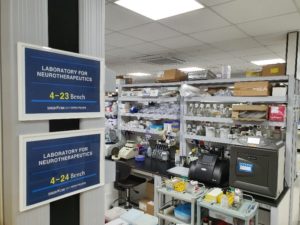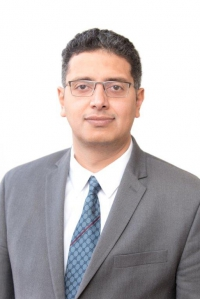Clinicians Network Research Efforts
The Clinicians Network members are at the forefront of AE Research. Learn more about their research involvements and accomplishments.
Research Spotlight
Soon-Tae Lee, MD, PhD.
Professor, Department of Neurology, Seoul National University Hospital; Division of Cancer Neurology, Integrated Cancer Care Center, Seoul National University Cancer Hospital; Seoul National University College of Medicine, South Korea.
About Dr. Soon-Tae Lee

Dr. Lee graduated from Seoul National University College of Medicine in 2001. He completed his neurology residency and fellowship at Seoul National University Hospital, and underwent clinical observership/Post-Doc at Center for Neuro-Oncology, Dana-Farber Cancer Institute and Brigham & Women’s Hospital, Boston, MA, USA. Dr. Lee has been working for Seoul National University Hospital since 2012 and now is a Professor in Neurology. His clinical interests are autoimmune neurology and cancer neurology. He operates the only antibody diagnostic lab for autoimmune encephalitis in Korea.
Could you elaborate on the research you are currently involved in?
I am focused on novel treatments of autoimmune encephalitis and neurologic complications of cancer. Although treatments of autoimmune encephalitis are improving rapidly, many patients still have poor responses to the current immunotherapies, resulting in long-standing disease burdens. To develop better therapeutic protocols, I research the mechanism of refractoriness and conduct clinical trials using novel immunotherapeutic agents in the disease.
What is an accomplishment you are especially proud of?
My key discoveries include:
- The use of tocilizumab in autoimmune encephalitis and new-onset refractory status epilepticus (NORSE);
- The development of clinical assessment scale in autoimmune encephalitis (CASE score);
- The discovery of HLA-association in LGI1 encephalitis.
I completed a prospective therapeutic trial in autoimmune encephalitis (phase 2a study to evaluate the safety and efficacy of 10% immunoglobulin in autoimmune encephalitis, clinicaltrials.gov number: NCT04175522) and am planning other clinical trials in the disease.
How do you see the field evolving?
Our knowledge about the pathogenesis and treatment of autoimmune encephalitis has been largely improved in a decade. Many researchers are actively involved in this area to discover hidden antibodies, cellular pathogenesis, definite diagnostic markers, and more effective treatments. Upcoming studies in years should dramatically improve the diagnosis, treatment and prognosis of the disease for the many patients and family suffering from it.
| Seoul National University Hospital | Laboratory |
 |
 |
Research Spotlight
Hesham Abboud, MD, PhD.

Director of the Multiple Sclerosis and Neuroimmunology program and a Staff Neurologist at the Movement Disorder Center, University Hospitals of Cleveland, Case Western Reserve University, Cleveland, Ohio, USA.
About Dr. Hesham Abboud
Dr. Abboud is board-certified in neurology. His special interests include Multiple Sclerosis, neuromyelitis optica, autoimmune encephalitis, autoimmune movement disorders, spinal movement disorders, spasticity management, and neuromodulation. Dr. Abboud earned his medical degree from Alexandria University in Egypt, where he also completed an internship and a residency in Neurology and Psychiatry. He obtained his Masters and Doctorate degrees in Neurology from Alexandria University before joining the Cleveland Clinic where he completed a residency in adult neurology, a clinical fellowship in movement disorders and neuromodulation, and a clinical fellowship in multiple sclerosis and neuroimmunology. Dr. Abboud received special training in transverse myelitis, neuromyelitis optica, and autoimmune neurology at Johns Hopkins University.
Could you elaborate on the research you are currently involved in?
As far as autoimmune encephalitis is concerned, our group has previously studied predictors of clinically relevant neuronal autoantibodies in patients presenting with new neurological symptoms and developed a scale to differentiate clinically relevant from clinically irrelevant results of the paraneoplastic panel. We are currently studying the clinical utility of the newer neuronal autoantibody panels in patients with a presentation suggestive of autoimmune encephalitis compared to the older paraneoplastic panel. We are also studying residual symptoms after acute attacks of autoimmune encephalitis and the prevalence and clinical characteristics of iatrogenic (drug-induced) autoimmune encephalitis. In addition, we are looking at the full spectrum of neurological disorders in patients with anti-thyroid antibodies, including Hashimoto’s encephalopathy (SREAT).
What is an accomplishment you are especially proud of?
Establishing a dedicated autoimmune encephalitis clinic at our institution for long-term management of AE patients. I’m also proud of contributing to the AE Best Practice Recommendations manuscripts, which will be published soon. These manuscripts are a first step towards a much-needed standardization of AE management.
How do you see the field evolving?
I believe that the next few years will witness the first randomized clinical trials in AE mirroring the recent trials in neuromyelitis optica – a related antibody-mediated neurological disorder. I envision several multicenter international collaborations testing different immunotherapeutic agents and evaluating outcome predictors in AE. I’m also hoping for a bigger focus on residual symptoms and long-term management of AE, including a better understanding of rates and predictors of recurrence. I also believe that newer antibodies will continue to be unveiled in patients with seronegative AE.